Building on the foundation established in 2015 with the visionary Leica SL-System, Leica Camera proudly introduces the Leica SL2, the storied brand’s new icon and next evolutionary step towards building the perfect all-purpose camera. By listening closely to the valued feedback of photographers and existing SL owners, Leica made many efforts to push the envelope of technological innovation and performance while respecting its heritage of design and legacy. In addition to a technical marvel of pure performance and unmatched build quality, the Leica SL2 is also a joyous experience to use with improved ergonomics and more comfortable grip married to the well-established, simplified three-button control layout, further unifying the Leica design language across multiple product lines. While cutting-edge new features such as in-body image stabilization unlocks newfound potential from legendary Leica M-Lenses, it simultaneously augments the growing selection of SL-Lenses which are some of the finest optics Leica has ever produced. The Leica SL2 is the natural evolution of the innovative Leica SL, serving as a ground-breaking embrace of the future of digital photography and videography while paying homage to its respected history and lineage.
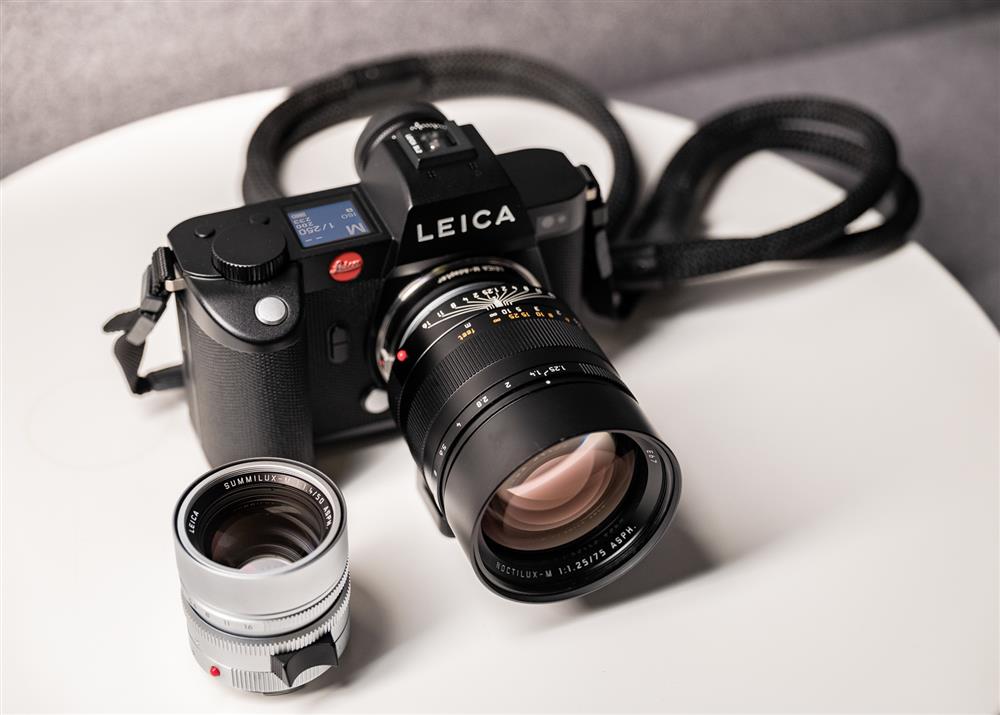
Crafted with conscience
The SL2 is the only mirrorless camera designed and crafted in Germany, with an unmatched all metal solid construction and elegant leather wrap to withstand the time and deliver years of photographic pleasure, thanks to the sustainability guaranteed by consistent firmware updates.
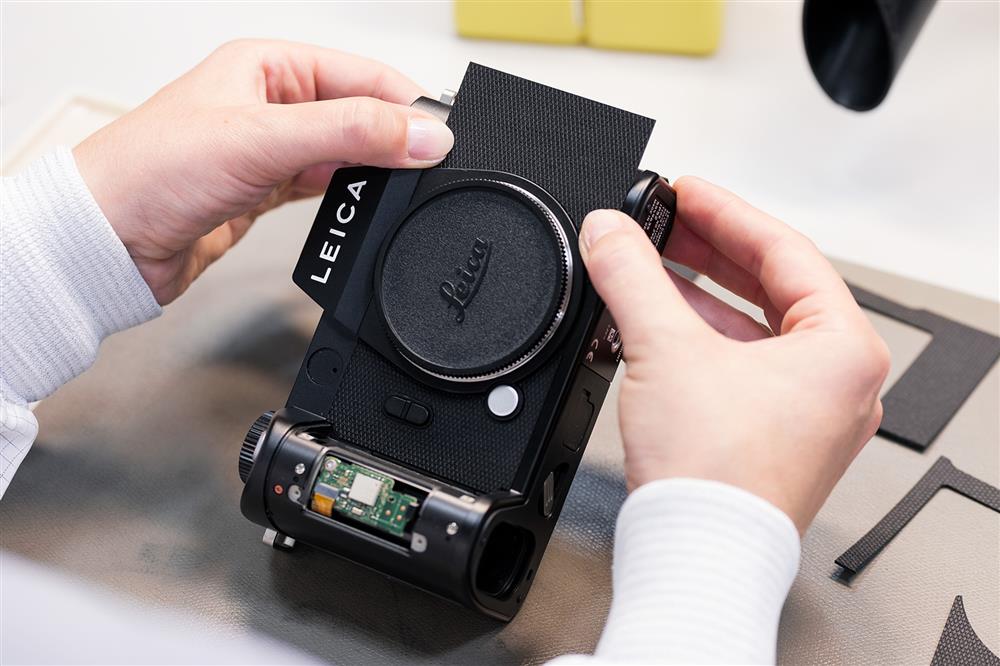
Streamlined design with new status menus
The Leica SL2 offers an innovative user interface whose efficient design allows photographers to focus their attention on the creative process. The design alignment with the existing M and Q systems makes the adjustment even easier for existing Leica photographers.
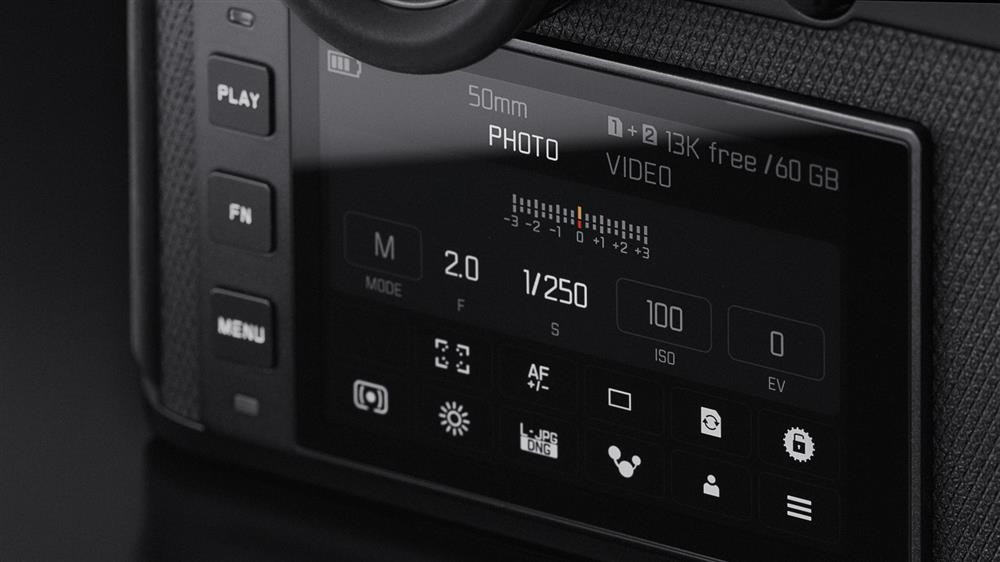
The main recording parameters can be viewed on the rear display and adjusted quickly and easily with a simple finger tap. A click wheel, a joystick and three strategically placed, individually configurable buttons also contribute to a straightforward operation. Thanks to two dedicated status menus for stills and video recording, the parameters for either shooting mode can be adjusted entirely separately from each other.
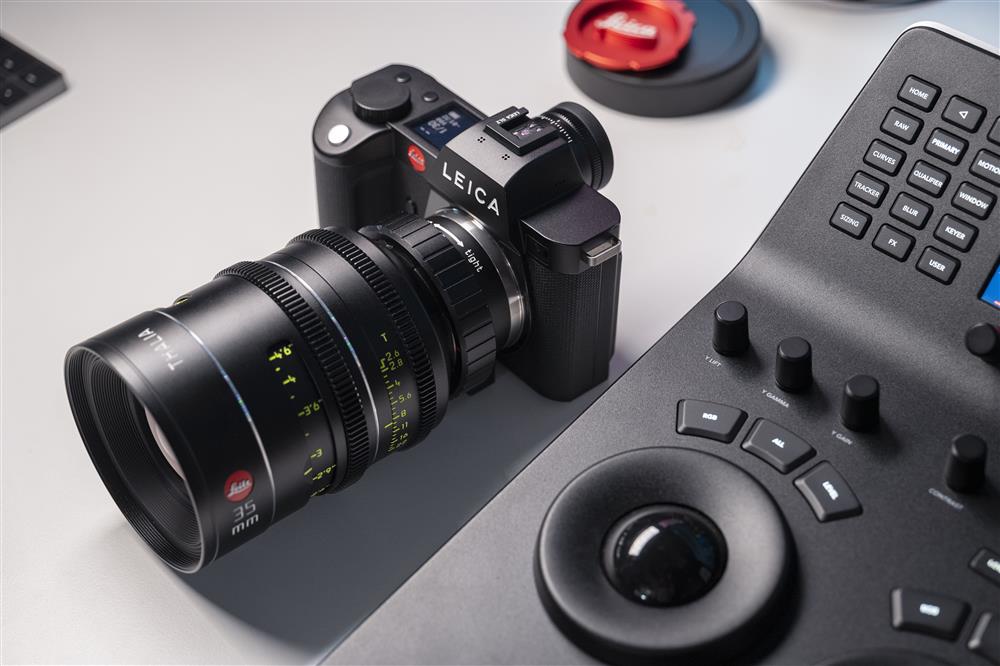
Improved ergonomics for stress-free shooting in any situation
Despite significant technical improvements, and the presence of in-body stabilization, the Leica SL2 has kept the same size than its predecessor and feels particularly compact to handle. Improved body design paired with increased durability make the SL2 the perfect companion for all forms of shooting. The SL2’s IP54 certification ensures an elevated weather sealing for more rugged situations, while a new option to turn off noise reduction during long exposures allows for more hands-free shooting. Less worry about the weather and environmental situations means photographers can focus more on getting the shot.
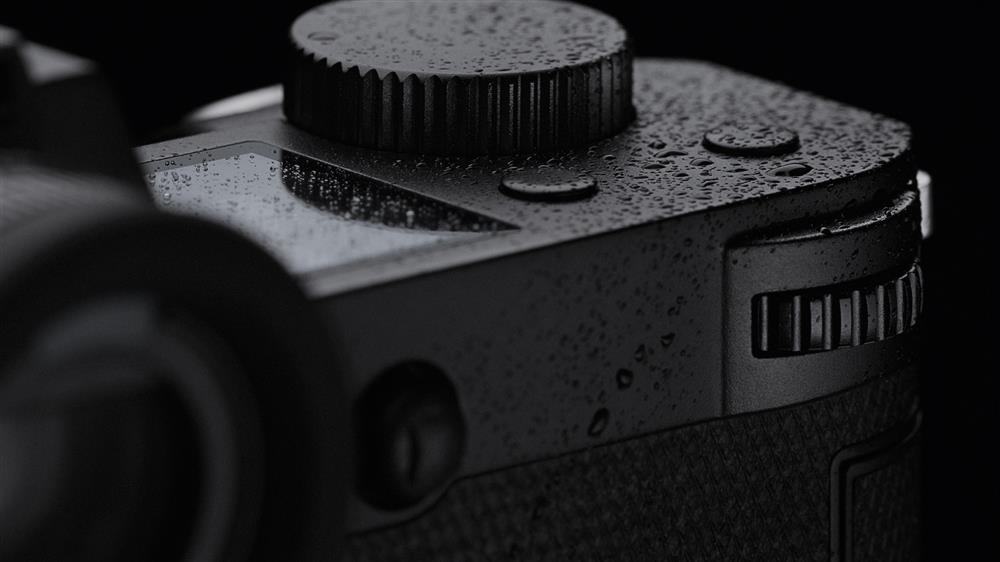
Overall the design of the SL2 recalls more of the iconic Leica identity and traditional design DNA elements that the brand has become known and loved for.
CMOS sensor with 47 megapixels for superior image quality
The unprecedented resolution of the SL2’s CMOS image sensor in full-frame format results in an unparalleled level of detail rendition and image quality. Enormous dynamic range, a color depth of 14 bits per RGB channel and a sensitivity of up to ISO 50,000 enable outstanding image quality in all lighting conditions. Even when combined with Leica TL lenses, which are designed for the smaller sensor format of the Leica TL2 and CL, the SL2’s sensor still delivers an excellent image resolution of over 20 megapixels.
New Leica Object Detection Autofocus
The new Leica Object Detention AF ensures a fast and reliable AF. In addition to an array of modes and features, including face recognition, the SL2’s high-performance AF system also automatically detects whether a subject is stationary or in motion, and subsequently switches between motion and focus priority.
Optical image stabilization through sensor-shift technology
In a major evolution of the SL, the Leica SL2 features a suspended sensor which adjusts its position in order to quickly and efficiently compensate for camera shake. This in-camera method even makes image stabilization available to lenses that are not equipped with their own.
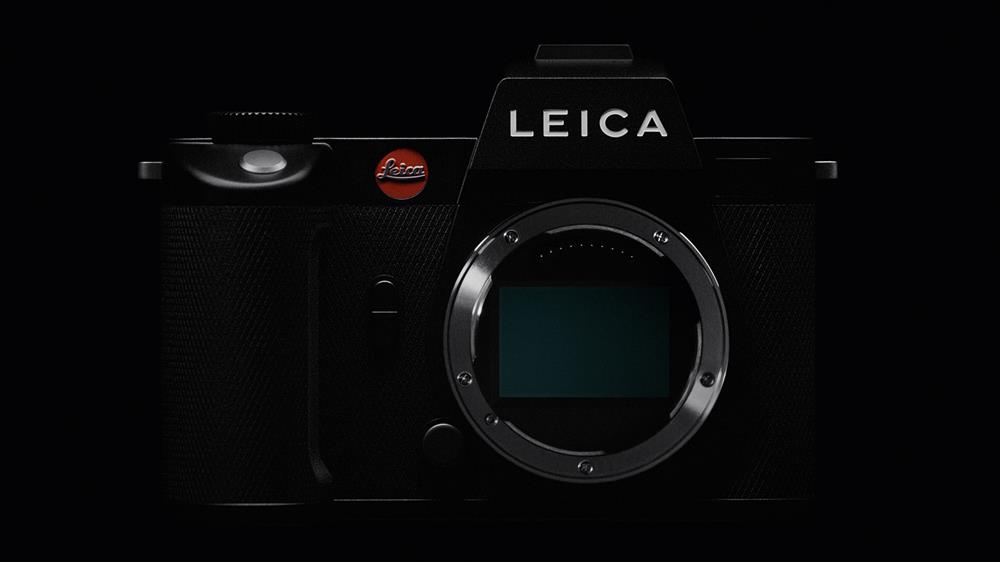
Additionally, in multishot mode, the tripod-mounted camera can record up to eight consecutive frames, whereby the sensor is shifted in half-pixel increments in between every exposure. This key feature results in images with an incredible quadrupled resolution of around 187 megapixels, leading to an extreme increase in detail resolution.
Leica EyeRes® viewfinder with even higher resolution
The camera’s electronic viewfinder now boasts a resolution of 5.76 megapixels, allowing for a large, entirely natural-looking viewfinder image. Simultaneously, the experience is further enhanced when using the touchscreen, which has increased in size to a 3.2-inch diagonal, and now offers a significantly higher resolution of 2.1 megapixels.
Maestro III processor for ultra-fast operation
The new Maestro III processor facilitates a superior operating speed that shines in many aspects of the SL2’s performance. The autofocus is significantly faster and allows for a virtually lag-free shutter release in any shooting situation, which is further complemented by the new Smart AF mode, which autonomously switches between focus priority and shutter release priority. Full-resolution recordings of consecutive images are possible at 10 frames per second with the focal plane shutter, and 20 frames per second with the electronic shutter. Thanks to two UHS-II-compatible SD card slots, raw files can be saved simultaneously in DNG and JPEG format.
Perfect tool for cinematographers
In addition to its great appeal for photographers, the Leica SL2 speaks the language of cinematographers, as the camera is able to record up to 60 frames per second in Cine 4K mode, and up to 180 frames per second in Full-HD mode. Activating Cine mode transforms the SL2 into a manually controlled cine camera as ISO becomes ASA, the shutter speed is marked in degrees on the rotary disk shutter, and the f-stops indicating the aperture ratio are replaced by T-stops, which measure the actual amount of light transmitted through the lens. Connecting audio equipment to the Leica SL2 no longer requires the use of adapters, as the camera now features a build in headphones and mic jack, complemented by a fully-fledged HDMI connector for external monitors.
Limitless connections
Featuring an L bayonet lens mount, the Leica SL2 is not only compatible with the ever-growing portfolio of SL-System lenses, but also with lenses of the TL-System and with the legendary lenses of Leica’s M, S and R-Systems via adapter, providing more than 170 Leica lens options, guaranteed to offer the right fit for any photographic scenario. The L-Mount Alliance expands this scope of possibilities even further, by giving SL2 photographers access to L-mount-compatible lenses from Sigma and Panasonic.
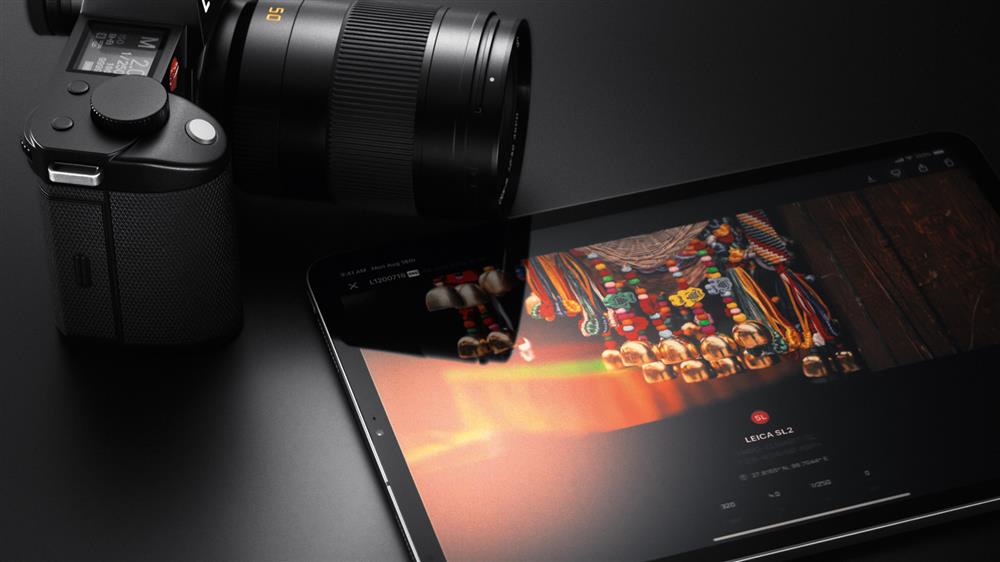
Leica FOTOS App
Of course, the new Leica SL2 is supported by Leica FOTOS, the versatile app available for Android and iOS Smartphones. Leica FOTOS connects directly to the camera via Wi-Fi (Bluetooth® is supported where available) and saves the registration details to make future connections between the camera and the app as fast and convenient as possible. Leica FOTOS enables photographers to access the Live View function of the camera and remotely change exposure-relevant settings such as aperture, ISO value, shutter speed and exposure compensation from a smartphone. It naturally also allows wireless control of the shutter release, which opens up entirely new creative opportunities.
Thanks to the high-resolution displays of modern smartphones, pictures can be viewed immediately at full size to assess their sharpness. The exposure parameters are also displayed, which can be extremely helpful for adjusting the settings for subsequent exposures.
As soon as a personal selection has been made, the pictures can either be shared in social networks, or saved for mobile post processing in the smartphone. Leica FOTOS can be used for this in combination with many popular post processing apps. To exploit the full potentials of digital image processing, the pictures can also be transferred to the respective app in DNG RAW data format. If users wish to save the finished pictures after processing on their smartphone, they can take advantage of the option for saving them to a separate Leica Gallery – this keeps painstakingly composed and processed pictures from the Leica FOTOS app separate from simple snapshots. Expect many new features and a whole new mobile workflow experience on the iPad when Leica FOTOS will be available in version 2.0 from November 21, 2019.
|
Leica SL2 Technical Data |
|
|
Camera Type |
Mirrorless full-frame system camera |
|
Type No. |
2998 |
|
Order No. |
10 854 EU/JP/US (black), 10 856 ROW (black) |
|
Buffer memory |
4 GB: DNG™: 78 recordings / JPG: > 100 recordings |
|
Storage medium |
UHS-II (recommended), UHS-I, SD/SDHC/SDXC memory card |
|
Material
|
Full-metal housing made of aluminum and magnesium, leatherette, cover, splash-water protected in compliance with IEC standard 60529 (protection type IP54). |
|
Lens Mount |
Leica L bayonet with contact strip for communication between lens and camera |
|
Operating conditions |
-10 to +40°C |
|
Interfaces |
ISO accessory shoe with additional control contacts, HDMI jack 2.0b Type A, USB 3.1 Gen1 Type C, Audio-Out 3.5 mm/Audio-In 3.5 mm, communication interface in the base cover for multifunction hand grip |
|
Tripod thread |
A 1⁄4 DIN 4503 (1⁄4”) with stainless steel in the base |
|
Dimensions (WxHxD) |
146 x 107 x 42 mm |
|
Weight |
approx. 835 g (without battery) |
|
Sensor |
|
|
Sensor Size |
CMOS sensor, pixel pitch: 4.3 μm / Fullframe (47.3 MP): 8368 x 5584 pixels / APS-C (20.2 MP): 5504 x 3664 pixels |
|
Image Stabilization |
5 axis Body Image Stabilization. Camera stabilizes up to 5.5 stops |
|
Filter |
RGB color filter, UV/IR filter, no low-pass filter |
|
Processor |
Leica Maestro series (Maestro III) |
|
File Formats |
Photo: DNG™ (raw data), DNG + JPG, JPG (DCF, Exif 2.31) Video: MP4: H.264/MPEG-4 AVC (Audio Format: 2ch 48 kHz/16 bit, AAC), MOV: H.264/MPEG-4 AVC (Audio Format: 2ch 48 kHz/16 bit, AC-3) |
|
Picture Resolution |
DNG™: 8368 x 5584 pixels (46.7 MP) JPG: 8368 x 5584 pixels (46.7 MP), 6000 x 4000 pixels (24 MP), 4272 x 2848 pixels (12 MP) |
|
Color Depth |
DNG™: 14 bit, JPG: 8 bit |
|
Color Space |
Picture: sRGB, ECI-RGB v2.0, Adobe RGB Video: Rec. 709/Rec. 2020 (HLG)/L-Log |
|
File Size |
DNG™: 84.4 MB JPG: depending on resolution and image content Video: max. length: 29 min, max. file size: 96 GB |
|
Recording Mode Video |
Video mode: P - A - S – M / Cine mode: M |
|
Video Resolution/Frame Rate |
MOV 5K: 29.97 fps, 25 fps, 23.98 fps / MOV C4K: 59.94 fps, 50 fps, 29.97 fps, 25 fps, 24 fps / MOV 4K: 59.94 fps, 50 fps, 29.97 fps, 25 fps, 23.98 fps / MOV FHD: 180 fps, 150 fps, 120 fps, 100 fps, 59.94 fps, 50 fps, 29.97 fps, 25 fps, 23.98 fps / MP4 4 K: 59.94 fps, 50 fps, 29.97 fps, 25 fps, 23.98 fps / MP4 FHD: 180 fps, 150 fps, 120 fps, 100 fps, 59.94 fps, 50 fps, 29.97 fps, 25 fps, 23.98 fps |
|
Bit Rate |
8/10 bit for recordings on SD card, 10 bit via HDMI output |
|
Video Gamma |
Rec. 709, L-Log Rec. 2020, HLG Rec. 2020 |
|
Viewfinder (EVF) |
Resolution: 5,760,000 dots, 120 fps, magnification: 0.78x, aspect ratio: 4:3, frame coverage: 100%, exit pupil position: 21 mm, setting range +2/-4 diopters, with eye sensor for automatic switchover between viewfinder and LCD panel, time delay 0.005 s |
|
LCD Panel |
3.2" (backlight LED) with anti-fingerprint and anti-scratch coating, 2,100,000 pixels (dots), format 3:2, touch control available |
|
Top Display |
1.28" highly reflective trans-reflective monochrome LCD, 128 x 128 pixels, viewing angle 120°; anti-fingerprint coating |
|
Shutter |
|
|
Shutter Type |
Electronically controlled focal plane shutter/electronic shutter |
|
Shutter Speeds |
Mech. shutter: 30 min to 1⁄8000 s / Electr. shutter function: 1 s to 1⁄40000 s / Flash Synch: up to 1/250 s |
|
Shutter Button |
Two-stage (1st stage: Activation of the camera electronics including autofocus and exposure metering, 2nd stage: Taking the picture) |
|
Self-Timer |
Delay time: 2 s or 12 s |
|
Picture Series |
Single Continuous Low Speed (3 fps), Continuous Medium Speed (6 fps), Continuous High Speed (10 fps without AFc/AE/WB), Continuous Super Speed (20 fps with electr. shutter function without AFc/AE/WB), Interval Shooting, Exposure Bracketing, Multishot |
|
Multishot |
Generates 2 DNGs: 1x 47 MP, 1x 187 MP (8 pictures are combined into one high-res image) |
|
Focusing |
|
|
Working Range |
30cm to ∞, With macro setting: from 17 cm |
|
Focus Mode |
Automatic (Autofocus in modes iAF/AFs/AFc/Touch AF) or manual. With manual setting: Auto Magnification and Focus Peakingoptionally available as focus aids |
|
Autofocus System |
Based on contrast metering and depth mapping |
|
Autofocus Modes |
Smart AF (autonomously selects AFs and AFc), AFs (picture taken only after successful focusing), AFc (picture can be taken at any time), AF setting can be saved |
|
Autofocus Metering Methods |
Spot (can be shifted), Field (can be shifted), Multi-Field, Zone, Face detection, object Tracking, optional Touch AF |
|
Autofocus Metering Fields |
225 |
|
Exposure |
|
|
Exposure Metering |
TTL ('Through The Lens' exposure metering) |
|
Exposure Metering Methods |
Spot, Center-Weighted, Multi-Field |
|
Exposure Modes |
Automatic program (P), Aperture priority (A): manual aperture setting, Shutter priority mode (S): manual shutter speed setting Manual (M): manual setting for shutter speed and aperture |
|
Exposure Compensation |
±3 EV in 1⁄3 EV increments or 1/2 EV increments |
|
Automatic Bracketing |
3 or 5 exposures, up to ±3 EV, in 1⁄3 EV increments Shift function: up to ±3 EV, additional LPG-HDR |
|
ISO Sensitivity Range |
Auto ISO: ISO 100 to ISO 50000, Manual: ISO 50 to ISO 50000 |
|
White Balance |
Automatic (Auto), Daylight 5200 K, Cloudy 6000 K, Shadow 7000 K, Tungsten 3200 K, HMI 5600 K, Fluorescent Warm 4000 K, Fluorescent Cold 4500 K, Flash 5400 K, Gray Card Live View, Gray Card, Color Temperature 2000 K to 11500 K |
|
Flash |
|
|
Flash Unit Connector |
About the accessory shoe |
|
Flash Sync Time |
1⁄250 s, slower shutter speeds available, automatic changeover to TTL linear flash mode with HSS-compatible Leica flash units if sync time is undercut |
|
Flash Exposure Metering |
Using center-weighted TTL pre-flash metering with Leica flash units (SF 26, 40, 40MkII, 58, 60, 64) or with system-compatible flash units, flash remote control SF C1 |
|
Flash Exposure Compensation |
SF 40: ±2 EV in 1⁄2 EV increments, SF 60: ±2 EV in 1⁄3 EV increments |
|
Equipment |
|
|
Microphone |
Stereo internal + microphone input 3.5 mm stereo jack |
|
Speaker |
Mono internal + headphones output 3.5 mm stereo jack |
|
WLAN |
The Leica FOTOS app is required to use the WLAN function. The Leica app is available from the Apple App Store™ or the Google Play Store™. Compliant with Wi-Fi IEEE802.11b/g/n, 2.4 GHz, channel 1-11 (2412-2462 MHz) and Wi-Fi IEEE802.11ac, 2.4 GHz & 5 GHz, channel 39-48 (5180-5240 MHz), channel 52-64 (5260-5320 MHz), channel 100-140 (5500-5700 MHz) (standard WLAN protocol), encryption method: WLAN-compatible WPA™/WPA2™ |
|
Bluetooth |
Bluetooth v4.2 (Bluetooth Low Energy (BLE)), 2402 to 2480 MHz |
|
GPS |
Via Leica FOTOS app |
|
Menu Languages |
English, German, French, Italian, Spanish, Russian, Japanese, Simplified Chinese, Traditional Chinese, Korean |
|
Power Supply |
|
|
Rechargeable Battery (Leica BP-SCL4) |
Lithium-ion rechargeable battery, rated voltage: 7.2 V (DC); capacity: 1860 mAh (min.), approx. 370 recordings (based on CIPA standard, without EVF); charging time: approx. 140 min (after deep discharge); manufacturer: Panasonic Energy (Wuxi) Co. Ltd., Made in China |
|
USB Power Supply |
USB charger function in standby mode or when switched off, USB power supply when switched on |
|
Charger (Leica BC-SCL4) |
Input: AC 100–240 V, 50/60 Hz, 0.25 A, automatic switchover; Output: DC 8.4 V 0.85 A; Manufacturer: Salom Electric (Xiamen) Co., Ltd., Made in China |


